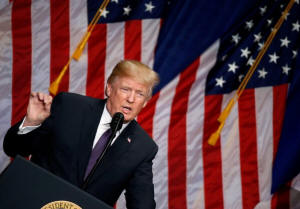|
Trump strategy document says Russia
meddles in domestic affairs worldwide
 Send a link to a friend
Send a link to a friend
 [December 19, 2017]
By Steve Holland and James Oliphant [December 19, 2017]
By Steve Holland and James Oliphant
WASHINGTON (Reuters) - U.S. President
Donald Trump's administration said on Monday that Russia interferes in
the domestic political affairs of countries globally, but stopped short
of accusing Moscow of meddling in the 2016 U.S. election.
The criticism of Russia, laid out in a new national security strategy
based on Trump's "America First" vision, reflects a view long held by
U.S. diplomats that Russia actively undermines American interests at
home and abroad, despite Trump's own bid for warmer ties with President
Vladimir Putin.
"Through modernized forms of subversive tactics, Russia interferes in
the domestic political affairs of countries around the world," said the
document.
It avoided directly citing what U.S. intelligence agencies say was
Russian meddling in last year's U.S. presidential election.

"Russia uses information operations as part of its offensive cyber
efforts to influence public opinion across the globe. Its influence
campaigns blend covert intelligence operations and false online personas
with state-funded media, third-party intermediaries, and paid social
media users or 'trolls,'" the document said.
Trump has frequently spoken of wanting to improve relations with Putin,
even though Russia has frustrated U.S. policy in Syria and Ukraine and
done little to help Washington in its standoff with North Korea.
In a speech laying out his strategy, Trump noted that he received a call
from Putin on Sunday to thank him for providing U.S. intelligence that
helped thwart a bomb attack in the Russian city of St. Petersburg.
Trump said the collaboration was "the way it's supposed to work."
"But while we seek such opportunities of cooperation, we will stand up
for ourselves and we will stand up for our country like we have never
stood up before," he said at the Ronald Reagan Building in downtown
Washington.
The audience of about 650 people frequently applauded the speech. It
included the military's Joint Chiefs of Staff, several Cabinet
secretaries, lawmakers, military personnel and officials from the
intelligence community and other agencies.
A U.S. Justice Department investigation is looking into whether Trump
campaign aides colluded with Russia, something that Moscow and Trump
both deny.

U.S. intelligence agencies have concluded Russians tried to tip the
election to Trump through hacking and releasing emails to embarrass
Democratic candidate Hillary Clinton and spreading social media
propaganda.
Facebook, Google and Twitter Inc are facing a backlash after saying
Russians used their services to anonymously spread divisive messages
among Americans in the run-up to the election.
Other Western nations, including France, have accused Russia of trying
to interfere in their elections.
TRUMP STRATEGY
Congress mandates that every U.S. administration set out its national
security strategy. The new Trump strategy is influenced strongly by the
thinking of top national security officials rather than that of the
president himself, said one official involved in preparing the document.
The Republican president's strategy reflects his "America First"
priorities of protecting the U.S. homeland and borders, rebuilding the
military, projecting strength abroad and pursuing trade policies more
favorable to the United States.
[to top of second column]
|

President Trump delivers remarks regarding the Administration's
National Security Strategy. REUTERS/Joshua Roberts

Talking points sent to U.S. embassies worldwide on what diplomats
should say about the new strategy makes clear that the official U.S.
position is tough on Russia.
An unclassified State Department cable, seen by Reuters, said:
"Russia tries to weaken the credibility of America's commitment to
Europe. With its invasions of Georgia and Ukraine, Russia has
demonstrated a willingness to use force to challenge the sovereignty
of states in the region."Harry Kazianis, an analyst at the
conservative Center for the National Interest think tank, said,
"While things with Moscow might be warm and fuzzy for the moment,
President Putin will not take too kindly to being labeled as what
essentially amounts to as an enemy of America."
It drops Democratic former President Barack Obama's 2016 description
of climate change as a U.S. national security threat, aides said.
Trump has vowed to withdraw the United States from the Paris climate
accord unless changes are made to it.
The Trump administration lumps together China and Russia as
competitors seeking to challenge U.S. power and erode its security
and prosperity.

The singling out of China and Russia as "revisionist powers" also
comes despite Trump's own attempts to build strong relations Chinese
President Xi Jinping.
A senior administration official said Russia and China were
attempting to revise the global status quo - Russia in Europe with
its military incursions into Ukraine and Georgia, and China in Asia
by its aggression in the South China Sea. Russia denies the
allegations that it meddled with the 2016 U.S. presidential
election.
Trump has been working with Xi to exert pressure on North Korea over
its nuclear and ballistic missile programs.
The administration warned that intellectual property theft by China
is a national security problem.
“We need to protect data in different ways. We need to ensure that
the legislation we have, like CFIUS, is up to date and reflects the
kinds of strategic investments that are taking place by other
countries,” an administration official said.
The Committee on Foreign Investment in the United States (CFIUS),
which reviews the purchase of U.S. assets by foreign companies, has
recently taken a strong stand against technology transfers to
Chinese companies.
(Additional reporting by Phil Stewart, Arshad Mohammed, Warren
Strobel and John Walcott; Editing by Alistair Bell and Jonathan
Oatis)
[© 2017 Thomson Reuters. All rights
reserved.]
Copyright 2017 Reuters. All rights reserved. This material may not be published,
broadcast, rewritten or redistributed.
 |